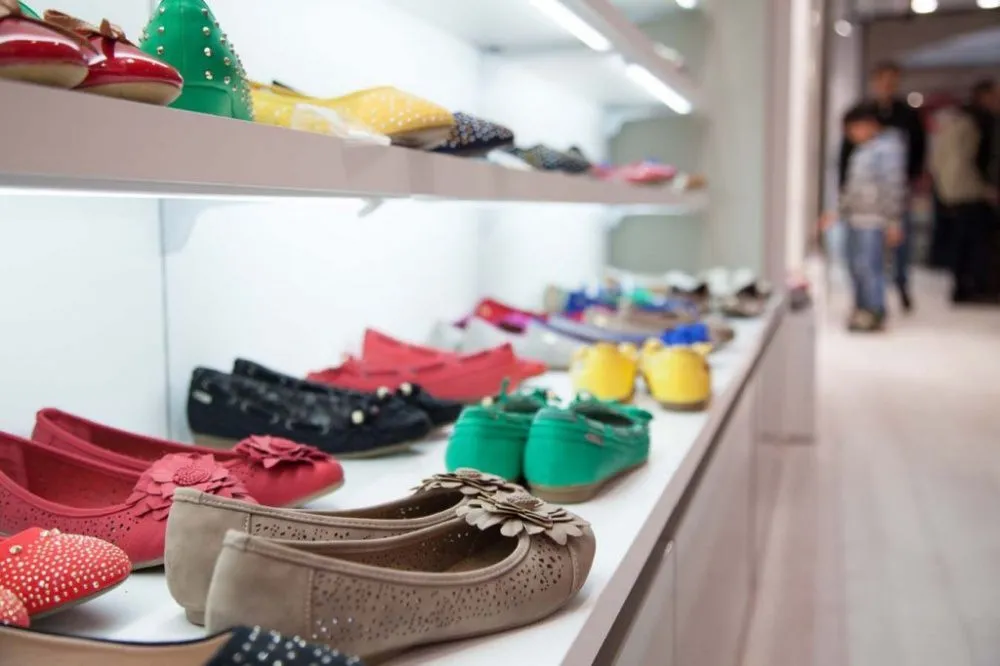
Rules for working with stocks

 Elena Kabanova - Partner of Retail Atelier, head of Marketing and Advertising practice, founder of AGIOTAGE FASHION MARKET, a new anti-crisis format for commission and discount stores.
Elena Kabanova - Partner of Retail Atelier, head of Marketing and Advertising practice, founder of AGIOTAGE FASHION MARKET, a new anti-crisis format for commission and discount stores.
Retail atelier - a company that creates new retail formats and outsourcing the management of retail structures, in its portfolio - management of retail chains and divisions such as Snezhnaya Koroleva, Nautical, the Vulkan gaming club network, Tanuki restaurants, a chain of shoe stores Fashion Galaxy, etc.
 Alexey Karakozov - Executive Director of the shoe and accessories network ALBA. Experience in retail - more than 10 years, he began working in ALBA in 2010, in the analytical department.
Alexey Karakozov - Executive Director of the shoe and accessories network ALBA. Experience in retail - more than 10 years, he began working in ALBA in 2010, in the analytical department. ALBA company - founded in 1993, began its activities with the wholesale supply of shoes from Italy to Russia. It has been developing retail since 1998. Today operates 48 salons.
Any crisis, even a deep and long one, has one remarkable property - it must end. In the meantime, he goes, the business tries to optimize and discipline himself as much as possible. Take, for example, purchases in Europe, where we were especially loved, because we always took a lot and without bargaining. Now, thanks to the crisis, sobering has come, and the purchases of Russian entrepreneurs are becoming much more calculated. Suppliers have already realized that lean years have replaced fat years, and are ready to cooperate on new conditions. For many well-known brands, the Russian market remains too important and promising to leave because of a temporary recession. In a number of cases, factories, with the formation of excess balances, are ready to compensate for losses due to future deliveries, since long-term partnership is a priority for them.
 Jacob Treskov - CEO of the international distributor SOHO-Fashion
Jacob Treskov - CEO of the international distributor SOHO-Fashion
Require supplier to meet delivery deadlines
Different trading companies have different opportunities, economic conditions and business settings, but for all, without exception, there is a strict rule: "Sales lost today are lost forever." If the supply of shoes for one reason or another is delayed by the beginning of the new season, the consumer will not wait - the demand will be redistributed to the products of other players. Delayed goods can only be sold at a large discount during the sales season, but the effectiveness of this approach is questionable. Therefore, by hook or by crook, require the supplier to comply with the delivery time, because under the current conditions, any delay can result in serious financial losses.
 Anatoly Levshin -
Anatoly Levshin - general manager of the Caprice chain of stores “If the collection is selected competently, it includes good basic and current models, compiled in the correct proportion and in the right dimensional grids, then it will be successfully sold and the proportion of residuals will be minimal, within the permissible limits. If the collection is not relevant, with weak basic models, then you need to prepare for losses, miracles do not happen.
The main factors affecting the successful sale of goods in the shoe segment - competent pricing, tracking poorly-sold models and timely adjustment of their prices to increase sales in the desired range, discounts and other promotions that stimulate demand - work well today. But during the crisis, additional, so to speak, reinsurance measures are needed: a very careful selection of models and sizes in the expensive segment, reasonable margins on different groups of seasonal goods. Now, shoe sellers need to focus on working with suppliers to provide additional discounts and better financial working conditions.
For the store to work successfully, it is advisable to update the collection constantly; for the season you can afford a maximum of 35% of the balance of the old collection. You can leave the base, but not seasonal goods in the balances, which will be optimally transported to the stock store, or sold in a super-finish sale, even at a loss. I am a supporter of the sale of stale goods, the faster you get rid of it, the better for business. It’s better to sell everything and pull out money that can be put into circulation again than wait until the next season. After all, there is no guarantee that you will sell the remnants of this season next year.
I do not agree with the opinion that commodity residues may “become gold”. In the regions - yes, perhaps, but not in Moscow, where customers know very well what is in fashion and what is relevant in every season and will never take the old. If you still have the old collection, at best, the capital will actually sell 25% of its volume, the rest can be thrown away. Or send it to drains, including regional ones, where buyers are not as demanding as in Moscow and other big cities. ”
Explore customer preferences
Timeliness is one, but not the only condition that avoids the formation of excess residuals. It is necessary to monitor trends, study consumer preferences, take into account the decrease in solvent demand. Now the trend is not designer refinements, but classic comfortable shoes. Many people are accustomed to high-quality shoes, and even in the current conditions they will not switch to a cheap leather substitute - rather, frugality is expressed in the fact that they will buy not two or three pairs, but one, but still high-quality. Those who love fashion, style and relevance, too, will not give up their addictions. And when the store tries to give out the remnants of the new collection, the buyer will immediately see it, draw conclusions and permanently delete the store from its list. If you properly take into account all the current market features and changing consumer preferences at the planning and contracting stages with suppliers, you can reduce the risk of large balances.

Do not get carried away with discounts
There are showrooms that deliver goods fractionally, in small batches, strictly on order, and, thanks to this form of work, they do not experience any headache with leftovers. But these are exceptions. The vast majority of companies import large quantities of goods and must somehow provide sales. As the market is very mobile today, many shoe retail companies are forced to abandon annual planning and switch to quarterly at best. For confident sales, a sound pricing policy is very important. When the ruble fell, some market players could not stand the nerves, and they pushed up prices, but then quickly came to their senses and themselves began to bring them down - already under the guise of sales. In general, now there are a lot of sales, discounts, promotions, but when there are too many of them, a negative effect appears: “sales” disorient the buyer, spoil the average check, and knock down the sale of a new collection. A more sensible approach, albeit more difficult to implement, would be comprehensive optimization measures that can keep prices up at about 15-20% compared to last year. Such optimization necessarily includes making a painful decision to reduce the margin and trade margin.

Work on leftovers
If, nevertheless, balances have appeared, then it is necessary to determine the degree of their liquidity and act. It is important not to “overexpose” the leftovers. For each model, the approach should be individual. Trendy models that fall into the trend for one season should be discounted and said goodbye to them in the near future, since in the foreseeable future they will be of little interest to anyone. The implementation of basic and classic models can be extended for several seasons, but do not apply the galloping discount scenario to them, when during the sale the model is sold at a 70% discount, and at the beginning of the new season the price returns to the previous level - this is wrong and causes negative feelings at the buyer.
When a decision on liquidation of balances is made in principle, the companies begin to make calculations, which can take into account the payback of the purchase and the payback ratio, the actual mark-up, inventory turnover, the amount of forecasted balances at the end of the season and other criteria. Some sellers will be more interested in the rate of liquidation, while others will be interested in price and margin. Someone has their own discount centers and online stores, someone's choice is limited to a massive sale or transfer of balances for sale to stock networks. Various combinations are possible, which depend on many circumstances: the volume and age of the residues, the quality of the shoes, the season, the deadlines, the qualifications of negotiators, the level of trust between partners. No matter how successful the company is, as a result, with the leftovers, it will be a useful experience and a good lesson for the future. The balances have the right to exist at all times, since we are talking about the most complete assortment satisfaction of the buyer, but their volumes should not exceed reasonable limits, since we are talking about the financial well-being of the company.
This article was published in the 128 issue of the print version of the magazine.
| Please rate the article |
Materials on the topic

Why is it so important to work with customer reviews, analyze them and use them in your work?

How to implement sales funnels in the shoe business

Effective methods that will help improve the effectiveness of sellers

Service in the store: successes and mistakes

How to determine the amount of shoe purchases for the next season?
Popular
 Coach turned to Big Data analysis and won the interest of a young audience
American handbag brand Coach has planned the success of its Tabby model among a younger audience, Generation Z, by turning to big data analysis, abandoning traditional and analogue tools, such as human intuition or the ability of any executive to sense “which way the wind will blow,” writes B.O.F.
Coach turned to Big Data analysis and won the interest of a young audience
American handbag brand Coach has planned the success of its Tabby model among a younger audience, Generation Z, by turning to big data analysis, abandoning traditional and analogue tools, such as human intuition or the ability of any executive to sense “which way the wind will blow,” writes B.O.F.
 IDOL updates the concept
The IDOL brand, part of the Melon Fashion Group portfolio, opened the first flagship in an updated concept in the Aviapark shopping center in Moscow.
IDOL updates the concept
The IDOL brand, part of the Melon Fashion Group portfolio, opened the first flagship in an updated concept in the Aviapark shopping center in Moscow.
 Louis Vuitton opens a new factory in Italy
Louis Vuitton has opened its second shoe factory in Italy. After opening the first one in Fiesso d'Artico in Veneto, the LVMH flagship brand has just opened a new production site dedicated to this category of footwear in the industrial zone of Civitano in the Marche region. There is also another brand production facility in Tuscany, where bags and leather accessories are produced, writes fr.fashionnetwork.com.
Louis Vuitton opens a new factory in Italy
Louis Vuitton has opened its second shoe factory in Italy. After opening the first one in Fiesso d'Artico in Veneto, the LVMH flagship brand has just opened a new production site dedicated to this category of footwear in the industrial zone of Civitano in the Marche region. There is also another brand production facility in Tuscany, where bags and leather accessories are produced, writes fr.fashionnetwork.com.
 The Euro Shoes@CAF exhibition will be held in Almaty
From March 11 to 13, the Euro Shoes@CAF (Central Asia Fashion) exhibition will be held in Almaty at the Atakent exhibition complex. The exhibition, which is the largest international event in the fashion industry in Central Asia, will present collections of clothing, shoes and accessories.
The Euro Shoes@CAF exhibition will be held in Almaty
From March 11 to 13, the Euro Shoes@CAF (Central Asia Fashion) exhibition will be held in Almaty at the Atakent exhibition complex. The exhibition, which is the largest international event in the fashion industry in Central Asia, will present collections of clothing, shoes and accessories.
 Euro Shoes will start operating on February 19 in Moscow!
The winter session of the international exhibition of footwear and accessories Euro Shoes premiere collection will be held in Moscow at the Expocenter from February 19 to 22. The organizers promise the presence of all the main participants at the exhibition, as well as new names from Europe, Asia and Russia.
Euro Shoes will start operating on February 19 in Moscow!
The winter session of the international exhibition of footwear and accessories Euro Shoes premiere collection will be held in Moscow at the Expocenter from February 19 to 22. The organizers promise the presence of all the main participants at the exhibition, as well as new names from Europe, Asia and Russia.
 American buyers couldn't buy Birkin bags and sued Hermès
French fashion house Hermès is facing a lawsuit in California from two customers who were unable to purchase exclusive Birkin bags. The fashion house is accused of unfair commercial practices.
American buyers couldn't buy Birkin bags and sued Hermès
French fashion house Hermès is facing a lawsuit in California from two customers who were unable to purchase exclusive Birkin bags. The fashion house is accused of unfair commercial practices.
 Why Rendez-Vous and Yandex Lavka released a “bread bag”
Shoe retailer Rendez-Vous announced the launch of a spring collaboration with Yandex Lavka and released a roll that resembles the shape of a woman’s handbag. This “Bread Bag” is presented in the Yandex.Lavka application at a price of 249 rubles. On the product packaging there is a promotional code for 1000 rubles, which can be spent in the Rendez-Vous network.
Why Rendez-Vous and Yandex Lavka released a “bread bag”
Shoe retailer Rendez-Vous announced the launch of a spring collaboration with Yandex Lavka and released a roll that resembles the shape of a woman’s handbag. This “Bread Bag” is presented in the Yandex.Lavka application at a price of 249 rubles. On the product packaging there is a promotional code for 1000 rubles, which can be spent in the Rendez-Vous network.
 Camper has released innovative sneakers - designers
Spanish brand Camper's new Roku sneaker features six interchangeable components to create up to 64 different looks and color combinations. Roku means "six" in Japanese.
Camper has released innovative sneakers - designers
Spanish brand Camper's new Roku sneaker features six interchangeable components to create up to 64 different looks and color combinations. Roku means "six" in Japanese.
 Christian Louboutin presented a collection in a cowboy style
At the Loubi Show in Paris, the French luxury brand Christian Louboutin presented its fall 2024 collection, following the trend - in the style of the Wild West. It included cowboy boots and rhinestone loafers.
Christian Louboutin presented a collection in a cowboy style
At the Loubi Show in Paris, the French luxury brand Christian Louboutin presented its fall 2024 collection, following the trend - in the style of the Wild West. It included cowboy boots and rhinestone loafers.
 Fashion Week takes place in Moscow
Fashion Week takes place in the Russian capital. Events include fashion shows, markets where you can purchase clothes, bags and accessories, and a B2B Showroom for fashion industry professionals.
Fashion Week takes place in Moscow
Fashion Week takes place in the Russian capital. Events include fashion shows, markets where you can purchase clothes, bags and accessories, and a B2B Showroom for fashion industry professionals.
 Turkish brand Vaneda on Euro Shoes
Street style, sport, outdoor, military – the main style directions of footwear of the company from Turkey
Turkish brand Vaneda on Euro Shoes
Street style, sport, outdoor, military – the main style directions of footwear of the company from Turkey
 Kari accuses Zenden of unfair competition and is suing the FAS
The largest Russian shoe chain, Kari, appealed to the Moscow Arbitration Court to declare the actions of the Federal Antimonopoly Service (FAS) illegal, writes RBC.
Kari accuses Zenden of unfair competition and is suing the FAS
The largest Russian shoe chain, Kari, appealed to the Moscow Arbitration Court to declare the actions of the Federal Antimonopoly Service (FAS) illegal, writes RBC.
 Fashion trends Fall-Winter 2023/24 for commercial footwear purchases
Permanent contributor to Shoes Report. Elena Vinogradova, an expert in sales and purchases in the fashion business, prepared an overview of the trends for the autumn-winter 2023/24 season especially for us.
Fashion trends Fall-Winter 2023/24 for commercial footwear purchases
Permanent contributor to Shoes Report. Elena Vinogradova, an expert in sales and purchases in the fashion business, prepared an overview of the trends for the autumn-winter 2023/24 season especially for us.
 MSCHF and Crocs launch "Big Yellow Boots"
Creator of the Big Red Boots, Brooklyn brand MSCHF has teamed up with American plastic clog and sandal brand Crocs for another oversized shoe. The new Big Yellow Boots will go on sale on August 9th.
MSCHF and Crocs launch "Big Yellow Boots"
Creator of the Big Red Boots, Brooklyn brand MSCHF has teamed up with American plastic clog and sandal brand Crocs for another oversized shoe. The new Big Yellow Boots will go on sale on August 9th.
 Five rules of professional lighting for a shoe store - something that is relevant in any season
When developing a lighting concept for shoe retailers, it is important to take into account not only the history of the brand, the architectural content of the premises, the target audience of the stores, but also the seasonality of the goods. With the onset of the cold season, client preferences change: bright weightless shoes are replaced by more massive models in discreet dark colors. Despite significant differences in summer and winter collections, the overall philosophy of the brand, its recognition should remain unchanged at any time of the year. Tatyana Ryzhova, an SR lighting expert in fashion retail, has identified five basic rules for a competent lighting concept for a shoe store for readers of the magazine, which will help to present winter assortment to customers in a winning way.
Five rules of professional lighting for a shoe store - something that is relevant in any season
When developing a lighting concept for shoe retailers, it is important to take into account not only the history of the brand, the architectural content of the premises, the target audience of the stores, but also the seasonality of the goods. With the onset of the cold season, client preferences change: bright weightless shoes are replaced by more massive models in discreet dark colors. Despite significant differences in summer and winter collections, the overall philosophy of the brand, its recognition should remain unchanged at any time of the year. Tatyana Ryzhova, an SR lighting expert in fashion retail, has identified five basic rules for a competent lighting concept for a shoe store for readers of the magazine, which will help to present winter assortment to customers in a winning way.
 Bertsy: what to look for when choosing a model
Bertsy and tactical boots are becoming more and more relevant footwear, and not only because of the start of the hunting season. In Russia, there are several dozen enterprises producing this type of footwear. Oleg Tereshin, Deputy Chief Technologist of ZENDEN, told Shoes Report about the differences and features of ankle boots and what you should pay attention to when buying them in specialized retail and online.
Bertsy: what to look for when choosing a model
Bertsy and tactical boots are becoming more and more relevant footwear, and not only because of the start of the hunting season. In Russia, there are several dozen enterprises producing this type of footwear. Oleg Tereshin, Deputy Chief Technologist of ZENDEN, told Shoes Report about the differences and features of ankle boots and what you should pay attention to when buying them in specialized retail and online.
 I doubt and object: how to find an approach to difficult clients?
How good and serene would be the work of a salesperson if the customers were calm, cheerful, always knew exactly what they wanted, and bought, bought, bought! It is a pity that this is possible only in dreams. Therefore, we will not dream, but we will act. Together with Maria Gerasimenko, a permanent author of SR, we understand the doubts and objections of buyers and build a strategy for working with them. Our expert pays special attention to the two main objections of buyers, on which 82% of sales are lost.
I doubt and object: how to find an approach to difficult clients?
How good and serene would be the work of a salesperson if the customers were calm, cheerful, always knew exactly what they wanted, and bought, bought, bought! It is a pity that this is possible only in dreams. Therefore, we will not dream, but we will act. Together with Maria Gerasimenko, a permanent author of SR, we understand the doubts and objections of buyers and build a strategy for working with them. Our expert pays special attention to the two main objections of buyers, on which 82% of sales are lost.
 EURO SHOES presents an updated section of the GLOBAL SHOES exhibition with collections of shoe and bag brands from Asian countries
EURO SHOES premiere collection is expanding. Along with the traditional pool of leading European footwear brands from Germany, Spain, Italy and Turkey, several dozen footwear and bag brands from the Middle Kingdom will be presented in the GLOBAL SHOES section at the Moscow Expocentre from August 29 to September 1.
EURO SHOES presents an updated section of the GLOBAL SHOES exhibition with collections of shoe and bag brands from Asian countries
EURO SHOES premiere collection is expanding. Along with the traditional pool of leading European footwear brands from Germany, Spain, Italy and Turkey, several dozen footwear and bag brands from the Middle Kingdom will be presented in the GLOBAL SHOES section at the Moscow Expocentre from August 29 to September 1.
 World Footwear Yearbook: Global footwear production reaches 23,9 billion pairs and is back to pre-pandemic levels
The Portuguese association of shoe manufacturers APICCAPS published the 13th edition of the international statistical bulletin World Footwear Yearbook for 2023, according to which in 2022 the production and export of shoes worldwide increased by 7,6% and 9%, respectively, and the world production of shoes reached 23,9 billion couples and returned to pre-pandemic levels.
World Footwear Yearbook: Global footwear production reaches 23,9 billion pairs and is back to pre-pandemic levels
The Portuguese association of shoe manufacturers APICCAPS published the 13th edition of the international statistical bulletin World Footwear Yearbook for 2023, according to which in 2022 the production and export of shoes worldwide increased by 7,6% and 9%, respectively, and the world production of shoes reached 23,9 billion couples and returned to pre-pandemic levels.
 Rostov footwear brand Novak presented a collection of sneakers and sneakers
In the spring-summer 2023 season, the Rostov-on-Don shoe brand Novak presented a cute collection of sneakers and sneakers for every day. The upper of the shoe is made of genuine leather, suede, nubuck, the sole is made of light EVA.
Rostov footwear brand Novak presented a collection of sneakers and sneakers
In the spring-summer 2023 season, the Rostov-on-Don shoe brand Novak presented a cute collection of sneakers and sneakers for every day. The upper of the shoe is made of genuine leather, suede, nubuck, the sole is made of light EVA.
 Jacquemus x Nike collaboration released
The second collaboration between Jacquemus and Nike, which has been talked about so much, is finally out. The appearance of the couple for many was a surprise. The model of Nike Air Force 1 sneakers, which was taken as the basis of the new collection, has undergone significant changes.
Jacquemus x Nike collaboration released
The second collaboration between Jacquemus and Nike, which has been talked about so much, is finally out. The appearance of the couple for many was a surprise. The model of Nike Air Force 1 sneakers, which was taken as the basis of the new collection, has undergone significant changes.
 Crocs releases a collaboration with Barbie
If Barbie ditched heels and wore crocs, they would be pink. It was this collection in pink that was released by the American brand of plastic clogs Crocs, for the release of the film "Barbie" in the United States.
Crocs releases a collaboration with Barbie
If Barbie ditched heels and wore crocs, they would be pink. It was this collection in pink that was released by the American brand of plastic clogs Crocs, for the release of the film "Barbie" in the United States.
 Shoe educational program: what shoe soles are made of
“What is the difference between TEP and EVA? What does tunit promise me? Is PVC glue? What is the sole of these shoes made of? ”- the modern buyer wants to know everything. In order not to smash his face in front of him and be able to explain whether such a sole suits him in soles, carefully read this article. In it, process engineer Igor Okorokov tells what materials the soles of shoes are made of and what makes each of them so good.
Shoe educational program: what shoe soles are made of
“What is the difference between TEP and EVA? What does tunit promise me? Is PVC glue? What is the sole of these shoes made of? ”- the modern buyer wants to know everything. In order not to smash his face in front of him and be able to explain whether such a sole suits him in soles, carefully read this article. In it, process engineer Igor Okorokov tells what materials the soles of shoes are made of and what makes each of them so good.
 How to set prices that will earn
Some businessmen still confuse the concept of margin with the concept of trade margins and set prices for their goods, guided solely by the example of competitors. No wonder they go broke! Analyst at the Academy of Retail Technologies Maxim Gorshkov gives several tips and formulas with which you can set not only ruinous, but also profitable prices.
How to set prices that will earn
Some businessmen still confuse the concept of margin with the concept of trade margins and set prices for their goods, guided solely by the example of competitors. No wonder they go broke! Analyst at the Academy of Retail Technologies Maxim Gorshkov gives several tips and formulas with which you can set not only ruinous, but also profitable prices.
 Sales of shoes and accessories: effective techniques for business rhetoric
Which speech modules are effective in communicating with potential and current customers of shoe stores, and which are not, Anna Bocharova, a business consultant, knows.
Sales of shoes and accessories: effective techniques for business rhetoric
Which speech modules are effective in communicating with potential and current customers of shoe stores, and which are not, Anna Bocharova, a business consultant, knows.
 We form the salary of sellers: expert advice
“How do you charge your consultants for personal or general sales?” Is one of the most popular questions causing a lot of controversy and gossip on the online forums of retail business owners. Indeed, how to properly form the earnings of sellers? But what about bonuses, where to get a sales plan from, do employees allow them to buy goods at discounted stores? In search of truth, the Shoes Report turned to a dozen shoe retailers, but no company wanted to disclose its motivation system - the process of its development was too complicated and individual. Then we asked four business consultants, and finally became convinced that the topic of seller motivation is very complex, because even our experts could not come to a common opinion.
We form the salary of sellers: expert advice
“How do you charge your consultants for personal or general sales?” Is one of the most popular questions causing a lot of controversy and gossip on the online forums of retail business owners. Indeed, how to properly form the earnings of sellers? But what about bonuses, where to get a sales plan from, do employees allow them to buy goods at discounted stores? In search of truth, the Shoes Report turned to a dozen shoe retailers, but no company wanted to disclose its motivation system - the process of its development was too complicated and individual. Then we asked four business consultants, and finally became convinced that the topic of seller motivation is very complex, because even our experts could not come to a common opinion.
 Technology Selling Issues
There is nothing worse than meeting the buyer with the words “Hello, can I help you with something?”, Because the seller works in the store just to help. Criticizing this well-established pattern of communication with the buyer, Andrei Chirkarev, business coach for effective sales and the founder of the New Economy project, shares the technology of truly selling issues with readers of Shoes Report.
Technology Selling Issues
There is nothing worse than meeting the buyer with the words “Hello, can I help you with something?”, Because the seller works in the store just to help. Criticizing this well-established pattern of communication with the buyer, Andrei Chirkarev, business coach for effective sales and the founder of the New Economy project, shares the technology of truly selling issues with readers of Shoes Report.
 The whole truth about Bayer. Who is he and how to become one?
Bayer is no longer a new, but still a popular and sought-after profession. It’s fashionable to be a buyer. Buyers are at the origins of the emergence and development of trends. If the designer offers his vision of fashion in the season, then the buyer selects the most interesting commercial ideas. It is on buyers that the policy of sales of stores and what, in the end, the buyer will wear depends on. This profession is surrounded by a magical fleur, often associated with a lack of understanding of what exactly is the work of a buyer.
The whole truth about Bayer. Who is he and how to become one?
Bayer is no longer a new, but still a popular and sought-after profession. It’s fashionable to be a buyer. Buyers are at the origins of the emergence and development of trends. If the designer offers his vision of fashion in the season, then the buyer selects the most interesting commercial ideas. It is on buyers that the policy of sales of stores and what, in the end, the buyer will wear depends on. This profession is surrounded by a magical fleur, often associated with a lack of understanding of what exactly is the work of a buyer.
 Fur, and not only: types of lining
In the production of winter footwear, various materials are used that are designed to retain heat and meet the requirements of consumers: natural sheepleather, artificial fur, artificial fur from natural wool and others. All types of lining fur have their own advantages and disadvantages. Let's consider the properties of each of them.
Fur, and not only: types of lining
In the production of winter footwear, various materials are used that are designed to retain heat and meet the requirements of consumers: natural sheepleather, artificial fur, artificial fur from natural wool and others. All types of lining fur have their own advantages and disadvantages. Let's consider the properties of each of them.
 Retail Arithmetic
Before you begin to solve specific problems, you need to find out how accurately all the leaders of your company understand the basic terminology of retail.
Retail Arithmetic
Before you begin to solve specific problems, you need to find out how accurately all the leaders of your company understand the basic terminology of retail.
 How to fire a worker without tears, scandal and trial
Sooner or later, any manager is faced with the need to part with an employee. Properly and on time the dismissal procedure will save the company money, and the boss himself - nerves and time. But why sometimes, knowing that a break in relations is inevitable, we put off the decision for months?
How to fire a worker without tears, scandal and trial
Sooner or later, any manager is faced with the need to part with an employee. Properly and on time the dismissal procedure will save the company money, and the boss himself - nerves and time. But why sometimes, knowing that a break in relations is inevitable, we put off the decision for months?






